After nearly two years of regulatory scrutiny, legal hurdles, and strategic negotiations, Microsoft has successfully sealed its landmark acquisition of video game giant Activision Blizzard in a historic $68.7 billion deal, Engadget reports.
The acquisition adds a treasure trove of beloved video game franchises to Microsoft's arsenal, such as Call of Duty, Diablo, Overwatch, and more.

Regulatory Battles and Concessions
The journey to this acquisition was far from smooth, with the U.K.'s Competition and Markets Authority (CMA) initially blocking the deal in April, citing concerns over competition in the cloud gaming market.
In response, Microsoft made a pivotal concession, agreeing to sell the cloud gaming rights for Activision Blizzard titles to French video game publisher Ubisoft.
This move, which ensures that Activision Blizzard's games will land not only on Xbox Game Pass but also on Ubisoft+ and other gaming platforms, helped the CMA greenlight the merger.
Microsoft further solidified its position by signing 10-year agreements with Nintendo and several cloud-gaming providers, securing approval from the European Union.
Notably, the U.S. Federal Trade Commission's attempts to halt the deal on competition grounds were unsuccessful.
Leadership and Financial Implications
Activision Blizzard CEO Bobby Kotick will stay on until the end of 2023, overseeing the transition. Meanwhile, Microsoft Gaming CEO Phil Spencer expressed excitement about integrating Activision, Blizzard, and King franchises into platforms like Game Pass.
CNBC tells us that the acquisition bolsters Microsoft's gaming portfolio with franchises that generated $7.5 billion in revenue during Activision Blizzard's latest fiscal year, a fraction of Microsoft's colossal $212 billion in sales.
This financial clout demonstrates Microsoft's commitment to expanding its presence in the gaming market.
Impact on the Gaming Landscape
This acquisition significantly altered the gaming industry's landscape, further establishing Microsoft as a dominant player. It places the company ahead of Nintendo and in contention with Sony, the owner of the PlayStation console and market leader Tencent.
The deal not only bolsters Microsoft's Xbox console but also enhances its Xbox Game Pass service, where subscribers access a vast catalog of games through downloads or streaming.
It grants Microsoft ownership of a studio specialized in mobile games, paving the way for greater success in the mobile gaming market.
Exclusivity and Future Prospects
While Microsoft has committed to delivering Call of Duty games on PlayStation, thanks to a 10-year pact with Sony, other Activision Blizzard titles may remain exclusive to Microsoft platforms.
This strategy mirrors Microsoft's approach with previous acquisitions, such as ZeniMax/Bethesda titles. It is a move that could influence the gaming market's dynamics in the future.
Addressing Workplace Culture Issues
In addition to the gaming industry's dynamics, Microsoft's acquisition of Activision Blizzard is expected to impact the workplace culture within the company.
Activision Blizzard has faced allegations of fostering a "frat boy" culture and workplace misconduct, with ongoing lawsuits in progress.
Observers hope that Microsoft will address these concerns and work towards a more inclusive and respectful work environment.
Stay posted here at Tech Times.

ⓒ 2025 TECHTIMES.com All rights reserved. Do not reproduce without permission.




